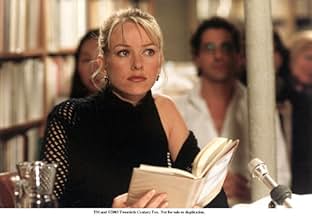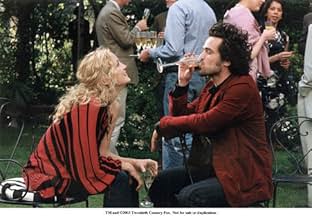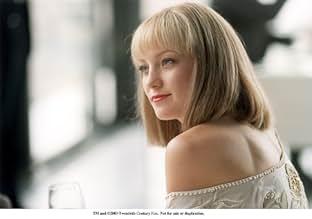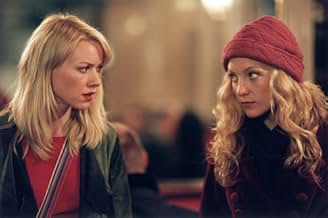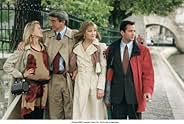IMDb-BEWERTUNG
4,9/10
12.419
IHRE BEWERTUNG
Französische vs. amerikanische soziale Bräuche und Verhaltensweisen werden in einer Geschichte über einen Amerikaner beobachtet, der ihre französische Schwester in Paris besucht.Französische vs. amerikanische soziale Bräuche und Verhaltensweisen werden in einer Geschichte über einen Amerikaner beobachtet, der ihre französische Schwester in Paris besucht.Französische vs. amerikanische soziale Bräuche und Verhaltensweisen werden in einer Geschichte über einen Amerikaner beobachtet, der ihre französische Schwester in Paris besucht.
- Regie
- Drehbuch
- Hauptbesetzung
- Auszeichnungen
- 2 wins total
Empfohlene Bewertungen
The performances are terrific, Kate Hudson proves that she is the actress that Goldie Hawn never was, and it is always good to see Leslie Caron looking her age and looking great. Now, the matter of the plot has been raised and the consensus so far is that it is a bag of clichés dumped into a blender and then poured out on film.
True. But, the book was no great shakes either and the screenplay simply has not risen above its origins.
I enjoyed Le Divorce for its cynicism and its predictability, frankly. It is nice every now and then to see a movie that elicits a sour chuckle rather than a guffaw or a shriek, and this is one of them.
True. But, the book was no great shakes either and the screenplay simply has not risen above its origins.
I enjoyed Le Divorce for its cynicism and its predictability, frankly. It is nice every now and then to see a movie that elicits a sour chuckle rather than a guffaw or a shriek, and this is one of them.
After viewing the unfortunate "Golden Bowl" (also by James Ivory) the day before, an exposure to "Le Divorce" was certainly a refreshing sip of champagne. This may be the first James Ivory movie I've seen where I forgot to look at the sets (unlike Ivory's other French venture, "Jefferson in Paris"). This is mostly due to the depth of certain actors and the fact that this time Ivory decides to close in on them rather than frame them. When the book came out, as an American living in Paris for 30 years, I avoided reading another set of American observations on everything French that foreign residents here hate, and I can't say that the movie avoids the pitfalls of throwing around generalities. Yet this is kept to an astonishing minimum, perhaps because few of the main characters really consider themselves typical representatives of their native country. Instead of a plethora of reflections coming out of their mouths, "the French are like this, the Americans are like that," the viewer can actually draw his own conclusions about which country has the "nicest" people and the place of formality when it comes to private matters. After all, would the story have been that much different if it had dealt with class differences in New York City? The characters who do tend to generalize are perhaps the least involved in what is going on. They form the real "décor" of the film, rather than the wallpaper and polished furniture, although these elements certainly haven't been omitted.
I find it strange that the two most interesting actors are supposed to belong to the subplot, Kate Hudson and Thierry L'Hermitte. The latter is currently being wasted in his late middle age in French films, and, like Louis Jourdan in "Gigi," manages to bring a little subtle something extra to the most stereotyped part in the film. I'd like to see him extend what he has done here, if any producer or director can be bothered.
The film had such a short run in France that I missed seeing it in a movie theater, and it was dismissed by most French critics on its release like the way that some of the American characters are dismissed by their French counterparts in the film itself. It would be a shame to overlook this light but not lightweight effort, for it has a surprisingly natural charm and raises interesting questions about how much the culture that forms our conditioning influences our very humanity.
I find it strange that the two most interesting actors are supposed to belong to the subplot, Kate Hudson and Thierry L'Hermitte. The latter is currently being wasted in his late middle age in French films, and, like Louis Jourdan in "Gigi," manages to bring a little subtle something extra to the most stereotyped part in the film. I'd like to see him extend what he has done here, if any producer or director can be bothered.
The film had such a short run in France that I missed seeing it in a movie theater, and it was dismissed by most French critics on its release like the way that some of the American characters are dismissed by their French counterparts in the film itself. It would be a shame to overlook this light but not lightweight effort, for it has a surprisingly natural charm and raises interesting questions about how much the culture that forms our conditioning influences our very humanity.
I lined up for this movie and bought the very last ticket for a showing--the theater was completely full. Despite it apparently being billed as a romantic comedy with dippy-looking blonde stars, it turned out to be quite good. I was relieved to find it was a more serious movie whose plot was woven around a divorce allright, but in some unexpected ways.
I believe it portrayed French culture realistically. The plot drew me in and although it was serious, there were comedic moments. By the end of the movie I found myself, perhaps much like the French, as seeing the situation as a "comedy" but in a philosophical way. It WAS a "romantic comedy" in that sense, but don't expect slapstick or sitcom-level humor, or even many funny moments. There's no more or less humor than one would find in real life. The occasional humor is subtle and entwined with the tragedy and realism of all the events that were happening. One eventually sees these events in the context of the French culture.
And the "dippy" blondes were a deliberate part of the character roles which were played with very good acting. The stereotypic, affluent American family characters were played very true to form, from appearance to personality to world-view. (Does the rest of the world really see us that way?) The movie was a nice escape and by the end it took some of the heaviness out of what is usually an emotionally burdensome, tragic life event, by showing how it can happen in France. Sex and love do make the world go around. Nice ending wrap-ups to the situations too, which again lightened the heart--although I wouldn't call this movie a light-hearted comedy by any means. It's a drama, with nice cinematography too. Good movie--9 out of 10!
By the way, I agree there is far too much good-movie-bashing with some of these reviews. If you only enjoy special effects, shoot-em-up movies, then don't go see one like this! It's subtle, more sophisticated, and you should be able to appreciate experiences like romance and other cultures to enjoy this film.
I believe it portrayed French culture realistically. The plot drew me in and although it was serious, there were comedic moments. By the end of the movie I found myself, perhaps much like the French, as seeing the situation as a "comedy" but in a philosophical way. It WAS a "romantic comedy" in that sense, but don't expect slapstick or sitcom-level humor, or even many funny moments. There's no more or less humor than one would find in real life. The occasional humor is subtle and entwined with the tragedy and realism of all the events that were happening. One eventually sees these events in the context of the French culture.
And the "dippy" blondes were a deliberate part of the character roles which were played with very good acting. The stereotypic, affluent American family characters were played very true to form, from appearance to personality to world-view. (Does the rest of the world really see us that way?) The movie was a nice escape and by the end it took some of the heaviness out of what is usually an emotionally burdensome, tragic life event, by showing how it can happen in France. Sex and love do make the world go around. Nice ending wrap-ups to the situations too, which again lightened the heart--although I wouldn't call this movie a light-hearted comedy by any means. It's a drama, with nice cinematography too. Good movie--9 out of 10!
By the way, I agree there is far too much good-movie-bashing with some of these reviews. If you only enjoy special effects, shoot-em-up movies, then don't go see one like this! It's subtle, more sophisticated, and you should be able to appreciate experiences like romance and other cultures to enjoy this film.
James Ivory is not exactly a politically orientated film maker, but it took some courage, and it was a politic message releasing a film about Americans living in Paris, and the culture clash between American and French in 2003. Although his film is more about family relations and cultural perception, it says a lot about humans being more important in the relations between two nations than their leaders politics.
Not that the relations in the film are that soft. I know quite well both American and French mentalities, and I appreciate the ironic mirror this film puts in the faces of the two peoples. There is certainly a certain dose of stereotype in the approach, but still the characters are well built, they act with logic most of the time, and some good acting from a bi-lingual team
helps a lot. Paris is still the best location to pick for a film ever. The plot is a little bit too long, and the end suffers from hollywooditis, but overall it is a satisfying cinema experience. I do not like the romantic genre too much, but it was better than I expected. 7 out of 10 on my personal scale.
Not that the relations in the film are that soft. I know quite well both American and French mentalities, and I appreciate the ironic mirror this film puts in the faces of the two peoples. There is certainly a certain dose of stereotype in the approach, but still the characters are well built, they act with logic most of the time, and some good acting from a bi-lingual team
helps a lot. Paris is still the best location to pick for a film ever. The plot is a little bit too long, and the end suffers from hollywooditis, but overall it is a satisfying cinema experience. I do not like the romantic genre too much, but it was better than I expected. 7 out of 10 on my personal scale.
I keep trying to figure out why this movie is rated so low. I thought it was very good, and that was before I started reading the book -- well more than halfway through, I think it's a faithful adaptation that delivers the storyline and the theme of the novel very well. I tend now to read the novel a movie is based on after I've seen the film, since my experience has taught me that doing the reverse always leads to disappointment in the movie. This was not an error with this title. I think all the casting, all the acting, and especially the direction, were well done.
It seems to me that somehow viewers were expecting too much from the movie. My philosophy is that expectations are arranged disappointments, and I try not to expect anything going in. I do admit that I had some doubts when it seemed that Merchant-Ivory were doing what looked like a light comedy, but there is much more to the book and film than that, first of all, and secondly, why should accomplished filmmakers not move around the genres? Look at Kubrick and The Archers, just to name two, who did so and did it successfully. I wonder how many people went in expecting "Howards End" and thus were disappointed, not in the film but by their own expectations. It's not fair to the filmmakers. Expecting "Le Divorce" to be on par with "Howards End" was like expecting "Howards End" to have the same effect as "Shakespeare Wallah" -- two completely different experiences. It's entirely possible, in fact, that Merchant-Ivory might not have done as good a job on "Le Divorce" had they not made "Howards End" first. It's a matter of process. My point being, that each film must be judged on its own merits.
I've read a couple of comments and message board posts that complain about how the movie makes French people look -- arrogant, garrulous, etc. I think that's overstating a generalization. The movie makes THESE PARTICULAR French people look arrogant and garrulous, because they are -- and devious and self-centered and boorish. But to leap to the conclusion that the movie is making a statement about all French people is patently ridiculous. "The views expressed by the characters in this movie are entirely their own".
On the other hand, one has to remember that Diane Johnson, who wrote the book and a number of books about the culture since, spends half her time in France. She does't take her subjects lightly; she's an intelligent, thoughtful, and though-provoking writer, and I would urge the people who find the movie too subjective to go to its source and read the book. They will find that the book is written from the point of view of one person, and is about the relations between two families -- not two complete cultures. Just because people say something about a culture does't make it true. Perception itself is subjective. In the book (I can't recall if this occurs in the film, I'll have to see it again) Uncle Edgar, perhaps the most sensible character, himself speaks those words that send a shiver of annoyance up my spine: "You Americans. You think..." As if we all think the same thing (and we all know THAT isn't true!). It shows that subjectivity is a common human trait, that we look at the world with our own particular set of blinders, filter our thought through our cultural stance, although I think that perhaps French thought is more synthesized and common than American thought which is, by nature of the population, more diverse.
In the end I think that the book and the film are VERY objective, and let us look at our own judgmental selves and see how the judgmental and subjective nature of our thought and attitude can be damaging and inhibiting. I think that's the theme, and it comes across very well.
It seems to me that somehow viewers were expecting too much from the movie. My philosophy is that expectations are arranged disappointments, and I try not to expect anything going in. I do admit that I had some doubts when it seemed that Merchant-Ivory were doing what looked like a light comedy, but there is much more to the book and film than that, first of all, and secondly, why should accomplished filmmakers not move around the genres? Look at Kubrick and The Archers, just to name two, who did so and did it successfully. I wonder how many people went in expecting "Howards End" and thus were disappointed, not in the film but by their own expectations. It's not fair to the filmmakers. Expecting "Le Divorce" to be on par with "Howards End" was like expecting "Howards End" to have the same effect as "Shakespeare Wallah" -- two completely different experiences. It's entirely possible, in fact, that Merchant-Ivory might not have done as good a job on "Le Divorce" had they not made "Howards End" first. It's a matter of process. My point being, that each film must be judged on its own merits.
I've read a couple of comments and message board posts that complain about how the movie makes French people look -- arrogant, garrulous, etc. I think that's overstating a generalization. The movie makes THESE PARTICULAR French people look arrogant and garrulous, because they are -- and devious and self-centered and boorish. But to leap to the conclusion that the movie is making a statement about all French people is patently ridiculous. "The views expressed by the characters in this movie are entirely their own".
On the other hand, one has to remember that Diane Johnson, who wrote the book and a number of books about the culture since, spends half her time in France. She does't take her subjects lightly; she's an intelligent, thoughtful, and though-provoking writer, and I would urge the people who find the movie too subjective to go to its source and read the book. They will find that the book is written from the point of view of one person, and is about the relations between two families -- not two complete cultures. Just because people say something about a culture does't make it true. Perception itself is subjective. In the book (I can't recall if this occurs in the film, I'll have to see it again) Uncle Edgar, perhaps the most sensible character, himself speaks those words that send a shiver of annoyance up my spine: "You Americans. You think..." As if we all think the same thing (and we all know THAT isn't true!). It shows that subjectivity is a common human trait, that we look at the world with our own particular set of blinders, filter our thought through our cultural stance, although I think that perhaps French thought is more synthesized and common than American thought which is, by nature of the population, more diverse.
In the end I think that the book and the film are VERY objective, and let us look at our own judgmental selves and see how the judgmental and subjective nature of our thought and attitude can be damaging and inhibiting. I think that's the theme, and it comes across very well.
Wusstest du schon
- WissenswertesThe painting sold before Roxy's LaTour is Claude-Joseph Vernet's "La Nuit, au Port au Clair de Lune", which is in the Louvre's permanent collection.
- PatzerWhen Isabel and Edgar have their last outing together, Isabel is clearly wearing red nail lacquer in the restaurant. When they say goodbye outside, her nails are no longer red.
- SoundtracksQu'est-ce qu'on Attend pour Être Heureux ?
Music by Paul Misraki
Lyrics by André Hornez
Performed by Patrick Bruel and Johnny Hallyday
Top-Auswahl
Melde dich zum Bewerten an und greife auf die Watchlist für personalisierte Empfehlungen zu.
- How long is The Divorce?Powered by Alexa
Details
- Erscheinungsdatum
- Herkunftsländer
- Offizielle Standorte
- Sprachen
- Auch bekannt als
- Le divorce
- Drehorte
- Produktionsfirmen
- Weitere beteiligte Unternehmen bei IMDbPro anzeigen
Box Office
- Bruttoertrag in den USA und Kanada
- 9.081.057 $
- Eröffnungswochenende in den USA und in Kanada
- 516.834 $
- 10. Aug. 2003
- Weltweiter Bruttoertrag
- 12.991.996 $
- Laufzeit1 Stunde 57 Minuten
- Farbe
- Sound-Mix
- Seitenverhältnis
- 2.39 : 1
Zu dieser Seite beitragen
Bearbeitung vorschlagen oder fehlenden Inhalt hinzufügen

Oberste Lücke
By what name was Eine Affäre in Paris (2003) officially released in India in English?
Antwort







